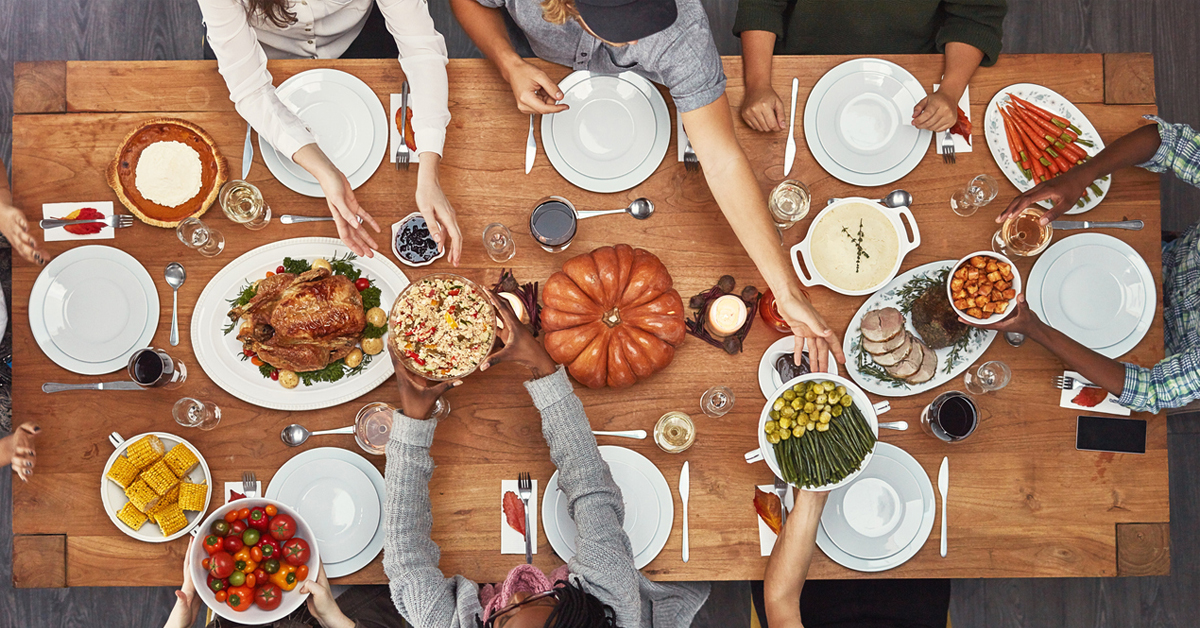Many of us associate Thanksgiving with delicious food, time away from work, and relaxation. But for healthcare professionals, it can be one of the busiest, most hectic times of the year. It might surprise you to learn that ER visits actually see an acute spike on certain holidays– Thanksgiving chief among them.
If you’re planning a Thanksgiving celebration, watch out for cooking accidents, overeating, overexertion, and food poisoning, so you don’t spend your turkey day in the emergency room. Learn more from the experts at UAB Medical West about the top reasons why people visit emergency rooms during the holidays, and what you can do to prevent those visits before the need arises.
Cooking Accidents
Since Thanksgiving typically involves preparing a big meal for your family and friends, knife accidents and kitchen burns are common reasons people visit the ER. Entertaining guests amidst the chaos of chopping vegetables, cooking a turkey, and preparing dessert, can be an overwhelming task.
To avoid a bloody accident or a painful burn, we recommend you save the adult beverages until after the meal is served. While it can be tempting to indulge to ease your nerves, alcohol can quickly impair your reflexes and lead to accidents. Likewise, if your guests are keen on helping you prepare the food and would enjoy assistance, it can be a fun way to bond. But, if they may cause more stress than help, kindly decline their offer. Too many cooks in the kitchen is often a recipe for cooking accidents!
Overeating & Overindulging
For many of us, there’s nothing better than eating too much food and dozing on the couch to the sounds of football. But overindulging in meats, snacks, fatty foods, and excess alcohol can lead to higher cholesterol, increased blood pressure, lightheadedness, and gastrointestinal issues –even for the healthiest adults. As you eat and drink throughout the day, be conscious of how many fatty and sugary foods you eat and your alcohol consumption. Drinking water as you eat and sip on holiday cocktails can help you stay hydrated and keep you from overindulging.
Sodium can be a another sneaky addition to our Thanksgiving meals that may go unnoticed with the full, uncomfortable effects felt later. We recommend eating salty nuts, cured meats, gravies, and other sauces in moderation to evade spikes in high blood pressure or heart disease. To prevent an ER visit, stay hydrated, control portion sizes, and stop eating once you feel full. If you feel full but want to savor the food, bring Tupperware for leftovers to enjoy the tasty food later.
Overexertion
For many Americans, Thanksgiving is the Superbowl of family competition. Often, what can start as a casual football game can lead to head injuries, wrist fractures, dislocated fingers, knee sprains, and more. If your family likes to play a physical game, ensure you properly stretch and hydrate before, during, and after. Don’t be afraid to take a few breaks if you find yourself out of breath, and cease activity if you feel lightheaded, dizzy, or nauseous.
The infamous Thanksgiving day “turkey trots” can feel like a good idea beforehand, but if you don’t properly train, they can ruin your entire holiday. If you choose to run in a race on Thanksgiving morning, we advise you to prepare beforehand, stretch properly, and stay hydrated throughout the race. Whether it’s football, a 5k, or another kind of game, family competition should be encouraged without overdoing it so nobody ends up in the emergency room on turkey day.
Food Poisoning
Many people decide to try their hand at new recipes or new cooking methods during Thanksgiving. And sometimes, it’s our first time cooking for a large group of guests. If you don’t prepare the food properly, especially the turkey, guests could experience upset stomach, stomach cramps, nausea, vomiting, fever, and other symptoms. To steer clear of accidentally positioning your guests, we recommend you follow proper guidelines.
For a frozen turkey, thaw it out in the refrigerator before you begin cooking, about one day per 4-5 pounds. Once your turkey is cooked, check the internal temperature to ensure it’s ready to be served. The experts recommend you measure three areas of the turkey: the thickest part of the breast, inner thigh, and wing. If the temperature in all 3 spots is 165 degrees, you’re good to go. After the celebrations, don’t store your turkey for longer than a week. If you want to keep it longer, pop it in the freezer to dodge food poisoning and an emergency room visit.
Stay Healthy & Enjoy Your Thanksgiving
Thanksgiving is a wonderful time to practice gratitude, eat delicious foods, and spend time with friends and family. But, the holidays aren’t much fun if you or a loved one ends up in the emergency room. This season, you can enjoy a memorable holiday by staying conscious of your health and safety.
No matter how diligent you are in avoiding accidents, they can still happen. If you do have a Thanksgiving day accident, UAB Medical West can help. Our emergency centers are open 24/7 and are ready to assist you and your family so you can enjoy your holiday.
Emergency Services on Thanksgiving Day
If you encounter any accidents or ailments this holiday season, our emergency centers are open. UAB Medical West proudly serves Hueytown, Hoover, Bessemer, McCalla, Vance, and others so that you can discover a solution to your pain. Call our professionals at 205-481-7000 or contact us online today!
